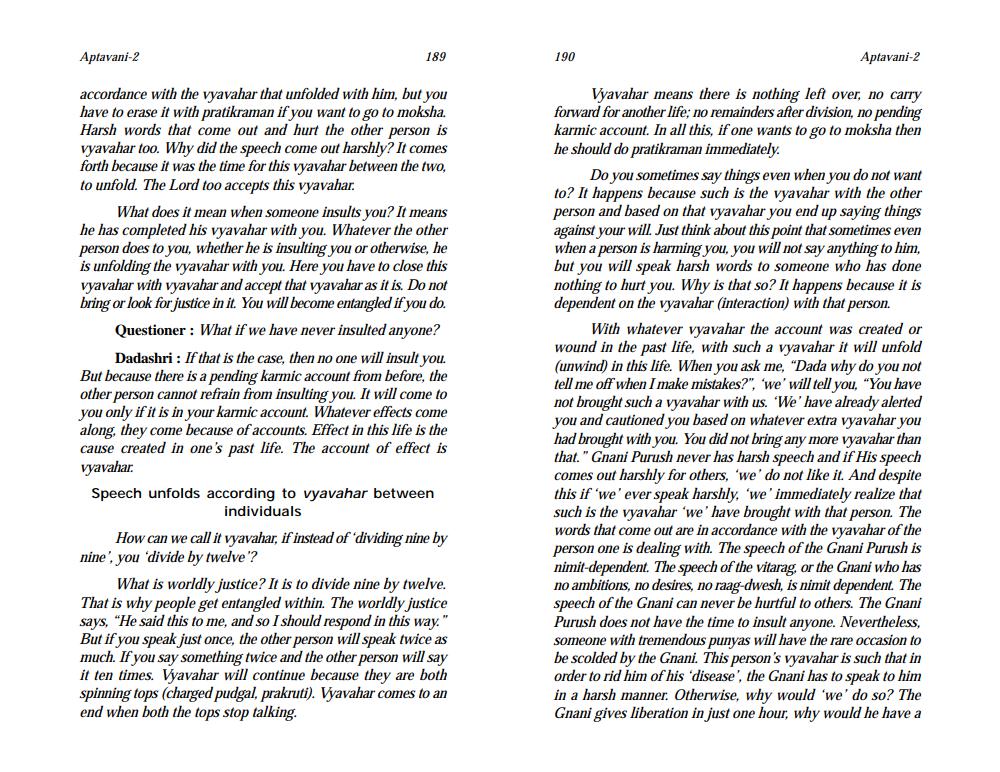________________
Aptavani-2
189
190
Aptavani-2
accordance with the vyavahar that unfolded with him, but you have to erase it with pratikraman if you want to go to moksha. Harsh words that come out and hurt the other person is vyavahar too. Why did the speech come out harshly? It comes forth because it was the time for this vyavahar between the two, to unfold. The Lord too accepts this vyavahar.
What does it mean when someone insults you? It means he has completed his vyavahar with you. Whatever the other person does to you, whether he is insulting you or otherwise, he is unfolding the vyavahar with you. Here you have to close this vyavahar with vyavahar and accept that vyavahar as it is. Do not bring or look for justice in it. You will become entangled if you do.
Questioner : What if we have never insulted anyone?
Dadashri : If that is the case, then no one will insult you. But because there is a pending karmic account from before, the other person cannot refrain from insulting you. It will come to you only if it is in your karmic account. Whatever effects come along, they come because of accounts. Effect in this life is the cause created in one's past life. The account of effect is vyavahar Speech unfolds according to vyavahar between
individuals How can we call it vyavahar, if instead of dividing nine by nine. you divide by twelve'?
What is worldly justice? It is to divide nine by twelve. That is why people get entangled within. The worldly justice says, "He said this to me, and so I should respond in this way." But if you speak just once, the other person will speak twice as much. If you say something twice and the other person will say it ten times. Vyavahar will continue because they are both spinning tops (charged pudgal, prakruti). Vyavahar comes to an end when both the tops stop talking.
Vyavahar means there is nothing left over, no carry forward for another life; no remainders after division, no pending karmic account. In all this, if one wants to go to moksha then he should do pratikraman immediately.
Do you sometimes say things even when you do not want to? It happens because such is the vyavahar with the other person and based on that vyavahar you end up saying things against your will. Just think about this point that sometimes even when a person is harming you, you will not say anything to him, but you will speak harsh words to someone who has done nothing to hurt you. Why is that so? It happens because it is dependent on the vyavahar (interaction) with that person.
With whatever vyavahar the account was created or wound in the past life, with such a vyavahar it will unfold (unwind) in this life. When you ask me, "Dada why do you not tell me off when I make mistakes?", 'we' will tell you, "You have not brought such a vyavahar with us. 'We' have already alerted you and cautioned you based on whatever extra vyavahar you had brought with you. You did not bring any more vyavahar than that." Gnani Purush never has harsh speech and if His speech comes out harshly for others, 'we do not like it. And despite this if 'we' ever speak harshly, 'we' immediately realize that such is the vyavahar 'we' have brought with that person. The words that come out are in accordance with the vyavahar of the person one is dealing with. The speech of the Gnani Purush is nimit-dependent. The speech of the vitarag, or the Gnani who has no ambitions, no desires, no raag-dwesh, is nimit dependent. The speech of the Gnani can never be hurtful to others. The Gnani Purush does not have the time to insult anyone. Nevertheless, someone with tremendous punyas will have the rare occasion to be scolded by the Gnani. This person's vyavahar is such that in order to rid him of his 'disease, the Gnani has to speak to him in a harsh manner. Otherwise, why would 'we' do so? The Gnani gives liberation in just one hour, why would he have a




